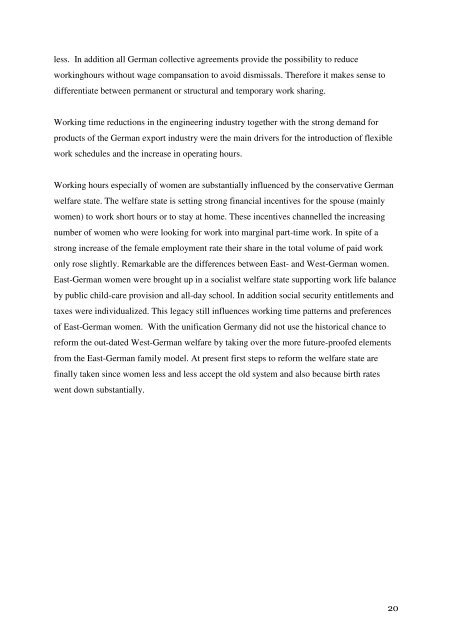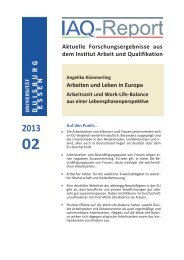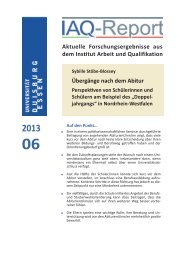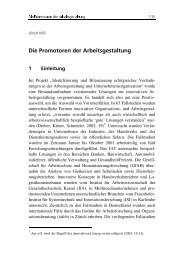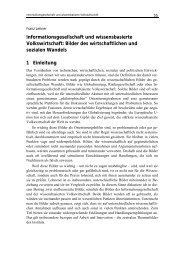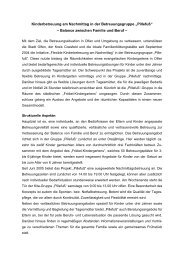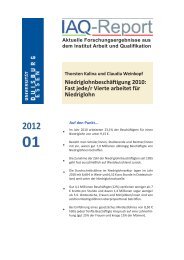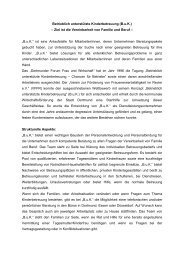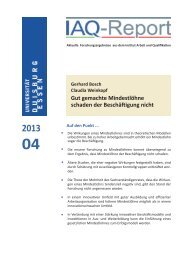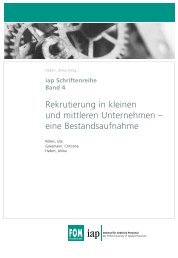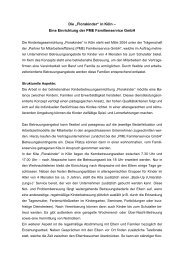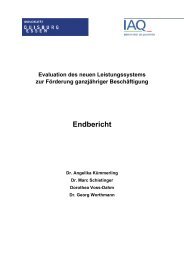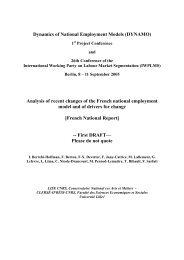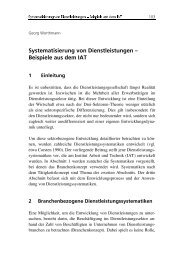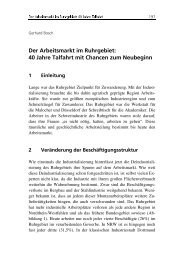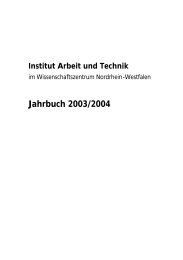less. In addition all German collective agreements provide the possibility to reduce <strong>work<strong>in</strong>g</strong>hours without wage compansation to avoid dismissals. Therefore it makes sense to differentiate between permanent or structural <strong>and</strong> temporary work shar<strong>in</strong>g. <strong>Work<strong>in</strong>g</strong> <strong>time</strong> reductions <strong>in</strong> the eng<strong>in</strong>eer<strong>in</strong>g <strong>in</strong>dustry together with the strong dem<strong>and</strong> for products of the German export <strong>in</strong>dustry were the ma<strong>in</strong> drivers for the <strong>in</strong>troduction of flexible work schedules <strong>and</strong> the <strong>in</strong>crease <strong>in</strong> operat<strong>in</strong>g hours. <strong>Work<strong>in</strong>g</strong> hours especially of women are substantially <strong>in</strong>fluenced by the conservative German welfare state. The welfare state is sett<strong>in</strong>g strong f<strong>in</strong>ancial <strong>in</strong>centives for the spouse (ma<strong>in</strong>ly women) to work short hours or to stay at home. These <strong>in</strong>centives channelled the <strong>in</strong>creas<strong>in</strong>g number of women who were look<strong>in</strong>g for work <strong>in</strong>to marg<strong>in</strong>al part-<strong>time</strong> work. In spite of a strong <strong>in</strong>crease of the female employment rate their share <strong>in</strong> the total volume of paid work only rose slightly. Remarkable are the differences between East- <strong>and</strong> West-German women. East-German women were brought up <strong>in</strong> a socialist welfare state support<strong>in</strong>g work life balance by public child-care provision <strong>and</strong> all-day school. In addition social security entitlements <strong>and</strong> taxes were <strong>in</strong>dividualized. This legacy still <strong>in</strong>fluences <strong>work<strong>in</strong>g</strong> <strong>time</strong> patterns <strong>and</strong> preferences of East-German women. With the unification <strong>Germany</strong> did not use the historical chance to reform the out-dated West-German welfare by tak<strong>in</strong>g over the more future-proofed elements from the East-German family model. At present first steps to reform the welfare state are f<strong>in</strong>ally taken s<strong>in</strong>ce women less <strong>and</strong> less accept the old system <strong>and</strong> also because birth rates went down substantially. 20
Literature: Anxo, D., <strong>Bosch</strong>, G., Bosworth, D., Cette, G., Sterner, T., Taddei, D. (Eds.) (1995), Work patterns <strong>and</strong> capital utilisation. An <strong>in</strong>ternational comparative study. Kluwer, Dordrecht, Boston, London. BMWA (2004), Tarifvertragliche Arbeitsbed<strong>in</strong>gungen im Jahr 2003. Berl<strong>in</strong>: Bundesm<strong>in</strong>isterium für Wirtschaft und Arbeit. <strong>Bosch</strong>, G. (1995), <strong>Work<strong>in</strong>g</strong> Time <strong>and</strong> Operat<strong>in</strong>g Hours <strong>in</strong> the Japanese Car Industry, <strong>in</strong>: Anxo, D., <strong>Bosch</strong>, G., Bosworth, D., Cette, G., Sterner, T., Taddei, D. (Eds.) (1995), Work patterns <strong>and</strong> capital utilisation. An <strong>in</strong>ternational comparative study. Kluwer, Dordrecht, Boston, London. <strong>Bosch</strong>, G. (1997), Annual <strong>Work<strong>in</strong>g</strong> Hours: an International Comparison, <strong>in</strong>: <strong>Bosch</strong> G.; Meulders D; Michon F. (Eds.):<strong>Work<strong>in</strong>g</strong> Time: New Issues, New Norms, New Measures, Dulbea, Brussel: 13-36. <strong>Bosch</strong>, G. (1999), The reduction of <strong>work<strong>in</strong>g</strong> <strong>time</strong>, pay <strong>and</strong> employment, <strong>in</strong>: Mar<strong>in</strong>, B. et al. (Eds.), Innovative Employment Initiatives, Aldershot, Ashgate. <strong>Bosch</strong>, G., <strong>and</strong> Kal<strong>in</strong>a, T. (2008), Low wage work <strong>in</strong> <strong>Germany</strong>: an overview, <strong>in</strong> G. <strong>Bosch</strong> <strong>and</strong> C. We<strong>in</strong>kopf (eds), Low wage <strong>Germany</strong>, New York: Russell Sage Foundation, 19–112. <strong>Bosch</strong>, G.; Schief, S.; Schiet<strong>in</strong>ger, M. (2005), Trends <strong>in</strong> der Arbeitszeitpolitik: zur Diskussion um Dauer und Flexibilisierung der Arbeitszeit sowie der Insolvenzsicherung von Arbeitszeitguthaben. Bonn: Friedrich-Ebert-Stiftung. Gesprächskreis Arbeit und Qualifizierung. Bothfeld, S., Klammer U., Klenner C. (2005), WSI-FrauenDatenReport 2005, H<strong>and</strong>buch zur wirtschaftlichen und sozialen Situation von Frauen, edition sigma, Berl<strong>in</strong>. EC European Commission) (2008), Employment <strong>in</strong> Europe ,Luxemburg. Ellguth, P. (2007), Betriebliche und überbetriebliche Interessenvertretung – Ergebnisse aus dem IAB- Betriebspanel 2005, WSI-Mitteilungen 3, 155–57. Ellguth, P., <strong>and</strong> Kohaut, S. (2007), Tarifb<strong>in</strong>dung und betriebliche Interessenvertretung – Aktuelle Ergebnisse aus dem IAB-Betriebspanel 2006, WSI-Mitteilungen 9, 511–514. Esp<strong>in</strong>g-Andersen, G. (1990), The Three Worlds of Welfare Capitalism. London: Polity Press. 11. Foss, M. (1984), Chang<strong>in</strong>g Utilization of Fixed Capital. An Element <strong>in</strong> Long-Term Growth, American Enterprise Institute for Public Policy Research. Wash<strong>in</strong>gton/London. Groß, H.; <strong>Bosch</strong>, G. ; Delsen, L.; Castro, A. ; Munoz de Bustillo y Llorente, R.,; Cette, G.; Bosworth, D. (2004): A Comparative Study of Operat<strong>in</strong>g Hours, <strong>Work<strong>in</strong>g</strong> Time <strong>and</strong> Employment <strong>in</strong> France, <strong>Germany</strong>, the Netherl<strong>and</strong>s, Portugal, Spa<strong>in</strong> <strong>and</strong> the United K<strong>in</strong>gdom (EUCOWE) – F<strong>in</strong>al Report (to be published at Spr<strong>in</strong>ger). Haipeter, T. (2009): Abweichende Tarifvere<strong>in</strong>barungen und das System der Flächentarifverträge. Gelsenkirchen: Institut Arbeit und Qualifikation (forthcom<strong>in</strong>g). Haipeter, T., Lehndorff, S. (2008), Collective barga<strong>in</strong><strong>in</strong>g on employment <strong>in</strong>security, report for the ILO (forthcom<strong>in</strong>g). Kümmerl<strong>in</strong>g, A.; Jansen A.; Lehndorff, S. (2008), Die Veränderung der Beschäftigungs- und Arbeitszeitstrukturen <strong>in</strong> Deutschl<strong>and</strong> 2001 bis 2006, report for the Hans-Böckler-Foundation (forthcom<strong>in</strong>g). Lehndorff, S. (1995), <strong>Work<strong>in</strong>g</strong> Time <strong>and</strong> Operat<strong>in</strong>g Time <strong>in</strong> the European Car Industry,<strong>in</strong>: Anxo, D., <strong>Bosch</strong>, G., Bosworth, D., Cette, G., Sterner, T., Taddei, D. (Eds.) (1995), Work patterns <strong>and</strong> capital utilisation. An <strong>in</strong>ternational comparative study. Kluwer, Dordrecht, Boston, London. Maddison, A. (1995), L’Économie Mondiale 1820-1992, Analyse et Statistiques OECD, Paris. Wanger, S. (2006), Erwerbstätigkeit, Arbeitszeit und Arbeitsvolumen nach Geschlecht und Altersgruppen. Ergebnisse der IAB-Arbeitszeitrechnung nach Geschlecht und Alter für die Jahre 1991-2004, IAB Forschungsbericht Nr. 2/2006, Nuremberg. 21


